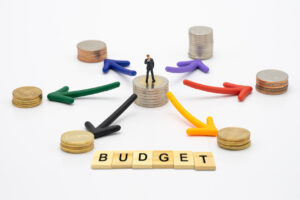Financial success isn’t about getting more money; it’s about making every dollar perform better for you. Effective budgeting can alter your financial situation, helping you meet your goals for weeks or years ahead of time. If you’re saving up for a house, planning retirement, or creating an emergency reserve, a good budgeting strategy can help you accelerate your progress while also reducing the stress of financial planning. This complete guide will teach you how to design an effective budget, track your progress efficiently, and keep moving towards your financial goals.
Understanding Your Current Financial Situation
Before you begin charting the path toward financial success, it is essential to know where you are. A lot of people miss this vital step and instead jump straight into budgeting without knowing the full financial picture. This can lead to unrealistic expectations and then abandoning budgets after a few weeks.
Begin by assembling all of your financial statements from the last three months. Include bank statements and credit card invoices as well as investment accounts and any other financial records. Calculate your monthly income coming from every source, which includes the salary, side hustles, rental income, side hustles, or investment earnings. Then, write down every expense regardless of how little. Purchases of coffee or subscription services, as well as impulse purchases, all count.
Setting Realistic Financial Goals
Effective financial goals have three features: they’re specific as well as measurable. They are also time-bound. Instead of stating “I want to save more money,” make an objective such as “I want to save $10,000 for a home down payment within 18 months.” This will help you determine how much to save each month and track your progress.
Prioritize your goals in accordance with their urgency and importance. The emergency funds are usually the first priority and are followed by debt with high interest repayment and finally more long-term goals, such as purchasing a house or retirement. Too many competing goals can dilute your funds and impede progress in all areas.
Creating a Budget
The most effective budget is one you are able to follow. A budget that is too strict often fails due to the fact that it does not take into account human nature and sometimes the requirement for flexibility. Begin with a realistic evaluation of the expenses you will need to cover and allocate the rest of your funds towards your objectives and discretionary spending.
The 50/30/20 principle provides an effective framework for starting that is 50% for necessities, 30% for needs, and 20% for savings and repayment. But don’t be shackled by these percentages if your particular situation calls for different allocations. Someone who has high-interest debt may put 30% or more to the repayment of debt, while those with low expenses could save up to 40%.
Tracking Your Progress
A consistent monitoring system is the key to successful budgeting. It separates those who stop after just a few weeks. Plan regular budget reviews, weekly in the beginning and then every month when you’re comfortable with the procedure. During these reviews, compare the actual expenses to your budgeted figures and pinpoint any significant differences.
Check for patterns in your spending habits that could be a sign of problems or potential opportunities. If you are consistently spending more than you can afford on food, you might require a better meal plan or locate more affordable shopping places. If you’re constantly over budget in a specific category, it could be possible to redistribute those funds to your objectives.
It is worth keeping track of your net worth each month as a general indicator of your financial health. As you pay off the debt and accumulate savings, your net worth will be increasing in a steady manner, giving you complete information about your financial performance beyond your monthly budget.
Tips for Sticking to Your Budget
The success of budgeting requires solid systems and long-term habits. Automation is the best way possible to eliminate willpower from the equation. Automate the transfer of funds into savings accounts, automated payment of bills, and also investments that are automatically made. If good financial habits are observed without effort, then you’re more likely to continue to do them over the long term.
Find accountability partners with the same financial goals. This could be your spouse, a friend, or even an online community. Regular check-ins with someone who understands your goals can help you stay focused during tough times and celebrate your successes throughout the process.
Taking Control of Your Financial Future
It’s about deliberate decision-making that aligns your spending with your beliefs and objectives. These strategies provide an outline for speeding up your financial progress; however, the ultimate success depends on a consistent implementation and ongoing revision of your plan.
Begin with small adjustments instead of attempting a total budget overhaul all at once. Concentrate on a few areas to improve, and learn the habits, and then slowly increase your efforts. Keep in mind that budgeting is an art that improves with practice, so you must be patient when you begin to develop the new habits of financial management.
Financial goals can be in your reach when you follow the proper budgeting method. Start today by taking a look at your present situation, setting particular goals, and then creating an achievable budget that brings you towards financial prosperity. Every dollar you invest now will accelerate your journey to the financial freedom that you deserve.
FAQs
1. What is the best time to check and modify my spending plan?
Examine your budget on a monthly basis for the initial few months, and then every quarter once you’re confident with the procedure. Change your budget immediately if there are major life events like the loss of a job, a salary increase, or other major expenditures.
2. What happens if I regularly overspend in specific areas?
To begin, you must determine if the budget was not realistic or if you require better spending discipline. If your budget isn’t realistic, then adjust it and make up for it by cutting other categories. If the issue is one of discipline, identify the triggers and devise strategies to deal with the issue.
3. Do I need to plan for irregular costs?
Absolutely. Estimate the cost for each year of things such as car maintenance, gifts, and insurance, and then divide by 12 to make the monthly allocations to your budget. This will prevent irregular expenditures from derailing your budget.
4. What should I set aside for unexpected expenses?
Start with $1,000 for an emergency fund for your first time. Then, build up to 3 to 6 months worth of expenditures. A higher amount may be more suitable in the case of irregular earnings or a volatile business.
5. What is the most effective app for budgeting?
The most reliable application is one that you use regularly. Popular options include Mint (free), YNAB (subscription-based), and PocketGuard. Explore a variety of options to discover one that meets your needs and preferences.




